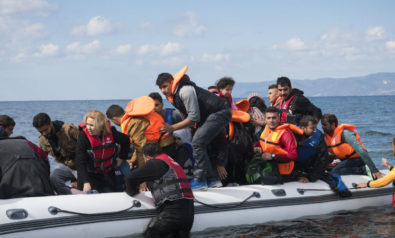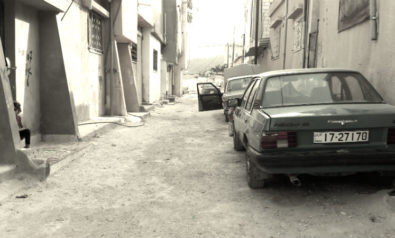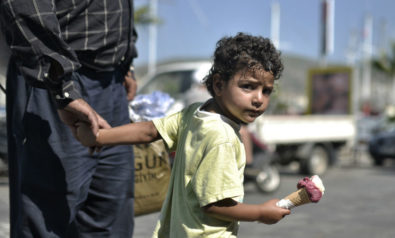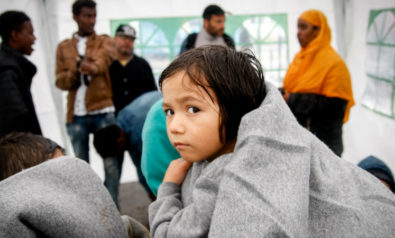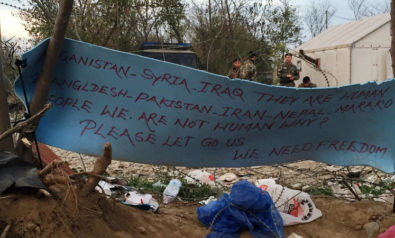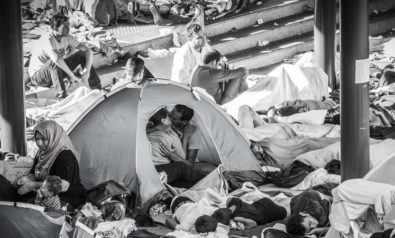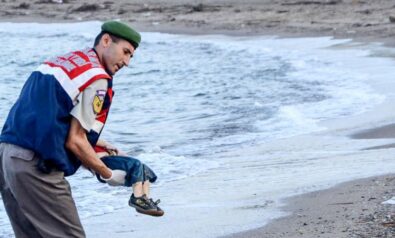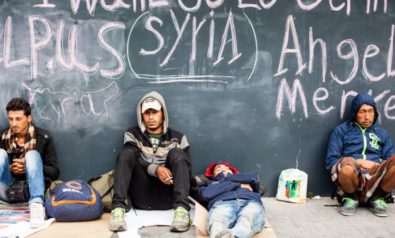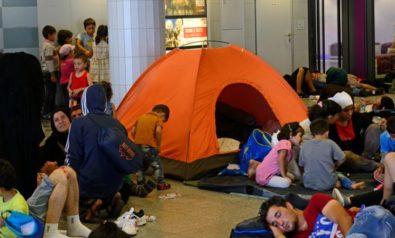The image of a dead 3-year-old boy spurs debate over how the world handles the refugee crisis.
It may appear that we have seen it all, at the tumultuous start of our young century. The planes hitting the Twin Towers in New York; the devastation left in the wake of earthquakes and tsunamis in Indonesia and Japan; people wreathing in pain following chemical attacks in Syria and Kurdistan; children being passed over barbed-wire fences in Hungary by desperate parents fleeing war in Syria; and live immolations and beheadings by the Islamic State (IS).
With information becoming ever easier to capture and disseminate due to the ubiquity of social media and the 24-hour news cycle, there is hardly a dearth of witnesses to humankind’s most inhumane moments.
Yet some images are more powerful than others. There is hardly anyone who is able to forget Nick Ut’s haunting image of a young girl scorched by napalm, which became the condemnation of the Vietnam War. Or Kevin Carter’s devastating image of a child trailed by a vulture in Sudan, as if waiting for hope itself to breathe its last breath beyond the photographer’s frame.
Now we have an image for our own times: That of a 3-year-old Syrian boy, Aylan Kurdi, washed up on the Turkish beach, his mother and 5-year-old brother—all dead. Refugees (or the politically convenient term “migrants”) have been fleeing war-torn Syria, Afghanistan, Somalia, Libya, Eritrea and Iraq in a steady flow of misery.
The question that begs to be asked is just how bad do we have to allow the situation to become that we need images of dead children to awaken our humanity?
British Prime Minister David Cameron announced on September 4 that the United Kingdom will take “thousands” of refugees from Syria, bending to public pressure precipitated by little Aylan’s tragic death. Cameron insisted that Britain would maintain its status as a moral nation and continue to do its best to help the most vulnerable.
Perhaps, if we are using the term “moral” in all seriousness, the prime minister should reconsider how the promise to house a further 20,000 refugees over the next five years weighs up against Britain’s role in the wars that engulf the region in the first place.
There is little need to go into detail on how the US-led invasions of Iraq and Afghanistan not only destabilized these two countries and the neighboring region, but also provided continued incentive for recruitment into the global jihadist cause. Britain, who can teach the world a lesson or two about colonial mismanagement, both stood by its ally’s side and actively participated in the mistakes being made one after another in these “liberated” countries. To mention just one: The de-Baathification of the Iraqi regime and the disbanding of its armed services—a measure that gave rise to the Sunni insurgency and set the conditions for groups like IS to flourish.
A Steady Flow of Misery
According to the UN Refugee Agency (UNHCR), the world’s refugee population was close to 20 million people at the end of 2014, with nearly 60 million forcibly displaced globally. The same report concludes that over 86% of them are hosted by developing countries. With nearly one in four refugees now originating from Syria, around 95% of them are hosted by completely overwhelmed neighbors in the Middle East.
Turkey has so far taken on the biggest refugee burden, climbing close to 2 million registered refugees, with Jordan, Lebanon, Iraq and Egypt making up over a further 2 million. The region’s wealthiest countries, such as Saudi Arabia, Kuwait, Qatar and the United Arab Emirates, have taken in a grand total of zero refugees. If the Saudi king can come to Washington DC and book out an entire hotel out on Labor Day weekend, then just imagine what he could do had he just a pinch of the goodwill shown by the Finnish prime minister or Uruguay’s former president—both of whom offered their homes to refugees.
Only 28 states accept refugees from the UNCHR resettlement program, with the United States taking in the most. In 2014, however, just over 20,000 Syrian refugees were resettled under the United Nations scheme, a drop in the ocean of the some 4 million fleeing the civil war.
With the US asylum system requiring stringent background checks, the State Department has recently agreed to increase the intake to “perhaps 1,800 next year,” according to The New York Times. Given America’s hand in the regional strife, it is impossible not to wonder whether urging Europe to shoulder the greater part of the consequences of US actions doesn’t beg for the need of a new definition of “hypocritical.”
The UK has taken in 166 Syrian refugees between June 2014 and June 2015, according to The Guardian. Although some 5,000 have been taken in by Britain since 2011, the growing crisis is hardly reflected in these bare figures.
With some 350,000 detected migrants crossing European Union borders between January and August 2015, the scenes from all over Europe are devastating. This year alone, more than 2,600 have drowned at sea. The dead “migrants” found in an old poultry truck, reported by the BBC to be taken to a former “veterinary border facility,” summarizes the value of human life perhaps a little too perfectly.
The shameful stand-off at Bicske and the stampede at the Keleti station in Budapest, the chaos on the Macedonian and Serbian borders, the “jungle” at Calais, the tear gas and the razor wire, and the light at the end of the tunnel: Germany.
Unhinged Democracy
The unhinged democracy that France and Britain helped bring about in Libya, or the exclusivist one the US has instituted in Iraq, or the “legitimate government” that Russia is supporting in Syria (resettlement places offered: zero)—all these geopolitical decisions, awash in oil and lucrative arms deals, are what these “migrants” are carrying on their backs as they walk and swim to Europe.
This is by no means to suggest that the West should not get involved in foreign conflicts. Humanitarian intervention—the Right to Protect (R2P) doctrine—despite having lost its innocence in places like the former Yugoslavia, is still a system worthy of being pursued and perfected.
Somehow we find ourselves living in a world with slave markets run by Islamic State fighters where women and girls are sold into sexual bondage. A world where hundreds of schoolgirls can be kidnapped by Boko Haram with impunity, most of them still missing more than a year and a half later. These are moral failures that not only justify R2P, but demand its implication.
But we must also be ready: If we decide to take the step in a direction of a conflict that does not directly involve us, we must be prepared to carry the burden of responsibility to a comprehensive end.
Luckily, the incredible warmth with which the people of Europe have reacted to the crisis gives hope in the better angles of our nature. The volunteers providing refugees with basic necessities in Budapest, Berlin or Vienna is nothing short of inspirational. The 11,000 Icelanders—of the country’s 330,000—who offered to open their homes to refugees is one of the single most powerful testaments to our common humanity.
Many a commentator has mentioned Germany’s guilt it still carries from World War II as a reason for its welcoming of nearly 800,000 refugees, almost 1% of its population. I’d like to think—or at least hope—that it isn’t guilt, but a compassion in which people are not ultimately divided by language, race class or culture, but united by a force stronger than the inanimate gloss of politics and the smell of money.
Sadly, this outpouring of goodwill is unsustainable. It is only a matter of time until European social services become overwhelmed, until anti-immigrant sentiment boils to the surface, and the dream of new life in Germany or Britain is overtaken by a bleaker, more practical reality.
The UN’s World Food Programme (WFP) in Lebanon and Jordan had announced earlier this summer that it will cut its aid to Syrian refugees to just $13 per person each month due to a lack of resources. The UN’s Syria appeal is only 25% funded, and it is only a matter of time until the millions of people in the camps across the Middle East will be forced to move in search of a better life, one free of child labor, rape and constant hunger.
It is often said—and rightly so—that the West cannot fix the rest of the world. However, if the world powers stop and consider the consequences of their historical avarice and geopolitical abuse dating back centuries, we in the developed world should bow under the weight of guilt before people suffering the wars we have either fomented, facilitated or fought directly.
Again, unlikely. Meaning that bombs will fall, drones will target and children will die, as we continue to stare aghast into the photogenic abyss of inhuman misery that gyres on in an endless cycle of our own creation.
The views expressed in this article are the author’s own and do not necessarily reflect Fair Observer’s editorial policy.
Photo Credit: Procyk Radek / Shutterstock.com
 We bring you perspectives from around the world. Help us to inform and educate. Your donation is tax-deductible. Join over 400 people to become a donor or you could choose to be a sponsor.
We bring you perspectives from around the world. Help us to inform and educate. Your donation is tax-deductible. Join over 400 people to become a donor or you could choose to be a sponsor.
Support Fair Observer
We rely on your support for our independence, diversity and quality.
For more than 10 years, Fair Observer has been free, fair and independent. No billionaire owns us, no advertisers control us. We are a reader-supported nonprofit. Unlike many other publications, we keep our content free for readers regardless of where they live or whether they can afford to pay. We have no paywalls and no ads.
In the post-truth era of fake news, echo chambers and filter bubbles, we publish a plurality of perspectives from around the world. Anyone can publish with us, but everyone goes through a rigorous editorial process. So, you get fact-checked, well-reasoned content instead of noise.
We publish 2,500+ voices from 90+ countries. We also conduct education and training programs
on subjects ranging from digital media and journalism to writing and critical thinking. This
doesn’t come cheap. Servers, editors, trainers and web developers cost
money.
Please consider supporting us on a regular basis as a recurring donor or a
sustaining member.
Will you support FO’s journalism?
We rely on your support for our independence, diversity and quality.




